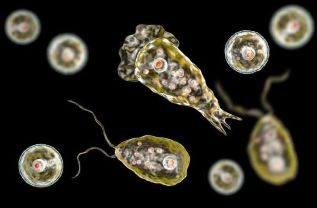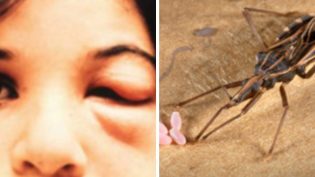BEDDING BED BUGS
Furniture, wallpaper, mattresses – everything is a favorite habitat of small flat insects, known as bedding bedbugs. Prefer to live in proximity with humans or domestic animals, to at night undisturbed to get out of their shelter to feed the warm human blood.
These bugs do not carry disease, but can cause an allergic reaction. If he bites too hard, the styling, the bangs can be put infection. Treat the bite with antiseptic or take an antihistamine medicine.
LICE
These insects also feed on human blood. And apart from that has evolved the opinion that they can live not only on the head, but all over the body.
Lice are the easiest to pick up through close contact with someone who already exists, and to fight - with the help of a variety of means, including special shampoos.
ITCHING BED BUGS
Scabies causes mites, which penetrate into the skin and lay eggs. And infection occurs when prolonged contact with the skin of a sick person.
The symptoms of scabies include itching, rash, and formation of crusts on the affected surface of the skin. Treated with special drugs.
PEPPERS TAPEWORM
This parasite is most often gets into the human body is ill-prepared pork, but also the transfer of is also possible by contact with the feces of an infected person or animal.
The parasite infects the intestine and the brain, which leads to the disease, by calling headaches. Depending on the severity of the disease treatment is either not executed at all, or use surgical methods.
Parasites build your life beside us (and in us), as we are about it, and had no suspicion of
Naegleria fowleri

Naegleria fowleri – amoeba living in warm freshwater, most often encountered in Southeast Asia and fall into the body while bathing and contact water into the nose.
Causes primary amoebic meningoencephalitis – a disease in which the brain is destroyed. The symptoms of the disease: headaches, high fever, vomiting, confusion, seizures, balance disorders and loss of consciousness. Currently there are only experimental drugs against the disease, so the chance of survival with him so far very low.
ROUNDWORMS
The whole group of worms (ascaris , Trichinella, pinworms, and so on). Most of them affects the intestines. But one kind that trichinosis, a parasite in the muscles.
Symptoms of infestation by these parasites: abdominal pain (roundworm), blood loss and anemia , itching in the rectal area (pinworms), pain, fever, swelling of the face, redness of the eyes, skin rashes (Trichinella), sputum, fluid and blood in the stool, damage to the mucous membrane of the large intestine (whipworm).
Get rid of these parasites is possible by using medications recommended by your doctor.
INTESTINAL GIARDIA
If after trips into the countryside, you began to worry about such symptoms as diarrhea, bloating, cramps, nausea, and then - to the fortuneteller do not go - your body will certainly penetrated this harmful parasite. Become infected it is possible through food and water, and also through contact with the feces of an infected person or animal. Fortunately, treating it is quick and not expensive drugs.
trypanosome
This parasite causes the life-threatening chagas disease. The disease is spread by a special kind of bug. Symptoms – fever, rapid fatigue, headaches and muscle pain, rash, loss of appetite, diarrhea, vomiting and swelling of the eyelids – are manifested very quickly.

The disease can lead to chronic defeat of the heart and intestines. The disease is treated with special preparations.
KRIPTORIDII
These parasites attack the intestines. It is spread through contact with the feces of an infected person or animal. Most often infection occurs when bathing. Called them diarrhea may last a long time, but most often treatment is not required.
PLAZMODIUM falciparum;
The vector of this parasite, which malaria are mosquitoes. This form of malaria is considered to be dangerous and causes more deaths than all the others.
Symptoms similar to those of influenza – chills, fever, sometimes nausea and vomiting. For the determination of the diagnosis is necessary laboratory studies of the blood. The main thing to remember - the sooner treatment is started, the more handicapped a chance at survival.
Trichomitus
This parasite causes a disease called trichomoniasis. Most infected have no symptoms. But some may feel itching, burning or irritation in the genital area. The disease is treated with antibiotics.
DIENTAMEBAFRAGILIS
Doctors do not yet know how this parasite, hitting the large intestine, gets into the body. In some diseases are asymptomatic, while others complain of abdominal pain and diarrhea.
DIENTAMEBAFRAGILIS (Dientamoeba fragilis) occurs in all regions of the world. Your doctor may prescribe special preparations to combat these microorganisms.
TOXOPLASMA gondii
This parasite feel at home in the meat, water and cat feces. In humans Toxoplasma gondii causes a disease with a similar name - toxoplasmosis. And its symptoms sometimes resemble the flu.
In pregnant women and people with weakened immune systems, symptoms may be more severe, for example, when toxoplazmózae can form cysts in the muscles, brain, and even... the eyes. In case of need is assigned to a treatment treatment.
GUINEA WORM
The disease caused by this parasite (its scientific name - Dracuncúlus medinensis), nowadays virtually met - and thanks to the spread of information about measures measures. The parasite gets into the human body in the absorption of water, in which there were copepods crayfish, infected larvae of the parasite.
In the human body, which grow in the intestines, then migrate into the lymph vessels, and from here penetrate into the skin and localized in the subcutaneous tissue. Between the symptoms can be fever, swelling and pain at the site of localization of the worms. But from the moment of infection to the appearance of the first symptoms may go through the year. And there's no treatment.






































